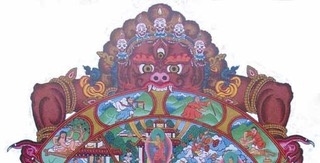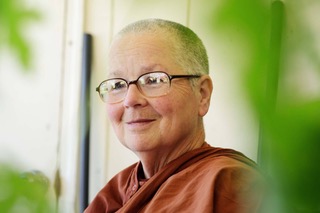"TRANSFORMATION" Is Now a Dana-Only At-Home Retreat, with Ayya Sobhana 3/30-4/4
Friends of Dhammadharini

Warm greetings dear friend,
We are writing to announce important late changes, and to welcome your registration and participation in:
Transformation:
Getting free of the prison of “self” by seeing causation
An at-home retreat via Zoom, March 30 - April 4, 2021, led by Ayya Sobhana Theri
New Information:
This retreat will now be hosted by Dhammadharini Monastery, as a dana-only retreat. Please register at https://www.dhammadharini.net/event-details/transformation-getting-free-of-the-prison-of-self-by-seeing-causation
If you have questions or difficulties with registration, please email dhammadhari...@gmail.com
"Dependent Origination" is what the Buddha came to understand when he awakened. That understanding permanently erased all the defilements and brought an end to rebirth. He very often pointed to Dependent Origination as the essence of his Teaching. But for many students and seekers, the description of Dependent Origination in the early texts is almost impossible to understand. Ayya Sobhana will make this rich set of teachings more accessible as a new way to understand daily life, and a set of themes for contemplation.
Ayya Sobhana’s approach is in line with the mainstream of Theravada Buddhism, informed by Western science and philosophy. The retreat will include Dhamma talks based on the early Suttas, guided meditation, and discussion. She will leave you with a set of readings to practice with on your own.
Retreat schedule.
All times in Pacific Daylight Time.
You may sit the entire retreat including small group discussions; or you may drop in for the Dhamma talks.
Tuesday, March 30
2:00 pm Orientation and social time among the retreatants
3:00 pm Mindful practice on your own
4:30 pm Welcome, opening Dhamma talk
5:15 pm Guided meditation
5:45 pm Closing blessings followed by meditation on your own.
Wednesday to Saturday, March 31, April 1, 2, 3
5:00 am Meditation
5:30 am Morning Puja chanting
6:15 am Dhamma talk
7:00 am Mindful practice and chores on your own
12:30 pm Dhamma talk and Q&A
1:15 pm Guided meditation
2:00 pm Small group discussions [only for those sitting the entire retreat]
3:00 pm Mindful practice, take a walk or mindful movement on your own
4:30 pm Dhamma talk, Q&A
5:15 pm Guided meditation
5:45 pm Closing blessings followed by meditation on your own.
Sunday, April 4
5:00 am Meditation
5:30 am Morning Puja chanting
6:15 am Closing reflection and sharing circle
7:00 am The retreat is finished, may the merits of your participation be a blessing for you!
Those who wish to continue can then join Dhammadharini’s regular Sunday Programs!
9:00-10:45 am. Join us for Guided Meditation and time for questions
1:00 - 2:30 pm Read and discuss the teachings of the Buddha
Suggestions for those who will sit the entire retreat:
Please make your home into a place of retreat by creating a clean and tranquil space for meditation. As a focus for devotion you may place a Buddha image, candle, flowers and incense. Remember, in the earliest days, the Buddha was represented by an empty space: a footprint, a Dhamma Wheel, an empty chair, or an empty space at the foot of a tree.
Make your meditation seat or cushion as comfortable as possible.
Try to block off your everyday problems, taking care of as much as you can before the retreat or deferring the problems until after the retreat.
Treat your essential daily chores as retreat practice, doing them slowly and mindfully.
Make the body clean and well rested before formal meditation. Wear simple, comfortable clothing.
Make a determination to avoid music, shows, and news during the retreat. Ask you family or co-residents to support your seclusion.
Make a determination to avoid all sexual activity during the retreat.
Observe complete silence, or at least minimize conversations during the retreat.
Take some exercise each day such as mindful movements or a brisk walk.
Keep a mind of loving patience for the inevitable distracting events that may come up during the retreat.
We have set up four Breakout Rooms, for the 2:00 pm Small group discussions on each full day of retreat. Watch for information on how to sign up for one or more of these sessions.
Readings for this retreat and your continued exploration: Sutta References for Dependent Origination
This retreat was originally hosted and organized by the Southern Dharma Retreat Center, an excellent meditation center and a leader in bringing the Dharma to the Southeastern United States. Ayya Sobhana has offered annual in-person retreats with Southern Dharma from 2009 until the 2020 pandemic, and hopes to resume in-person retreats there in future.

Ayya Sobhana trained with master Dhamma and meditation teacher Bhante Henepola Gunaratana for 25 years. Her primary practice is the Eightfold Noble Path, that is, integration of meditation with ethical living and compassionate relationships for the sake of liberation. She “went forth” into monastic life as a Samaneri in 2003 and obtained full Bhikkhuni ordination at Dambulla, Sri Lanka in 2006. In 2010 Ayya Sobhana moved from the Bhavana Society of West Virginia to Aranya Bodhi Awakening Forest Hermitage. Aranya Bodhi is a private redwood forest preserve and retreat for Buddhist monastic women on the Sonoma Coast of Northern California. In 2016 she was appointed Vice Abbess of Dhammadharini, offering teaching and training at both Aranya Bodhi and the bhikkhuni community’s new Dhammadharini Monastery in the Sonoma Mountain area of Penngrove, California, north of San Francisco. She teaches around the Bay Area, and on both coasts of the US, offering retreats at Spirit Rock Meditation Center, Southern Dharma Retreat Center, Buddhist Insights of New York and Cloud Mountain Retreat Center. Her primary practice is the Eightfold Noble Path—integration of meditation with ethical living and compassionate relationships for the sake of liberation.
